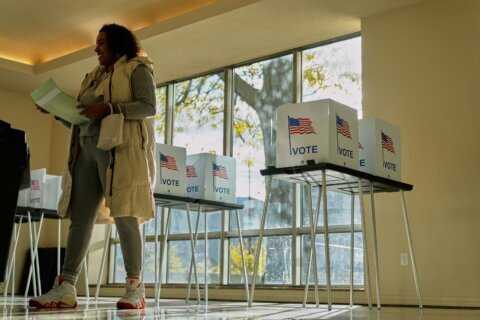Sign up for WTOP’s Election Desk weekly newsletter to stay up-to-date through Election Day 2024 with the latest developments in this historic presidential election cycle.
Tension and anger are some of the prevailing emotions in our lives ahead of a contentious election, and even after that aspect ends next week, the fallout will stretch well into the holiday season. It has the potential to mar family gatherings and holiday festivities with friends.
But it doesn’t have to. As long as you’re willing to find some common ground with someone who otherwise has a different viewpoint, at least according to an expert in tough discussions.
“Even as you are having a relationship with somebody that you may know, it is quite possible that we ignore or forget the humanity of those people,” said Carlton Green, one of the co-directors of the Intergroup Dialogue Training Center at the University of Maryland.
“Because we still have been so ensconced in these camps around ideas, and a part of what happens as we get separated — and put into what we perceive as opposing camps — a part of our mindset grows that we can’t trust the other people on the other side,” he added.
Another training center co-director, Jazmin Pichardo, said having dialogue can contribute to understanding, if you’re willing to slow down and engage.
“Let’s talk about what is the underlying value that is animating and informing this worldview,” Pichardo said. “If we can find some common ground there, that actually can allow us to shift the conversation so that we enter a place of, ‘Well, here’s where we’re mutually invested.’ And then we can talk about the particularities and sometimes even the politics around it.”
Both agreed that it’s fine to get emotional too. In fact, it can be revealing to someone who disagreed with you about something.
“If I can understand why you are so emotionally attached to something, it gives me more insight into your world,” Green said. “Here again, I’m humanizing you.”
“It also communicates to us a level of authenticity and investment,” Pichardo added. “So that we’re not just talking about the politics on the news, we’re really talking about what kind of impact (this has) on us.”
A lot of times, you’ll ask someone you disagree with to view the issue from your perspective, but only reluctantly, if not seriously, return the favor.
“What we generally do in conversation is that as you’re talking to me, I’m already in my head trying to formulate my response to you,” Green said. “A big piece of what we’re trying to do is get people to slow down and use some basic listening skills. So I reflect back to you that I actually heard you, and if you feel heard, it’s much more likely that you’ll participate in the conversation with me in a mutually curious way.”
But it can be hard for some people to do that.
“Part of that slowing down is also asking yourself, ‘What is it about this story that is hard for me to hear, that is difficult for me to believe?'” asked Pichardo. “That often comes back to, ‘It challenges a worldview that I have. It challenges a value that I’ve been taught and socialized to believe.'”
It also means bringing people with different beliefs into the conversation, otherwise, you’ll never achieve any harmony.
“Oftentimes, when we invite those people into the conversation, it feels like they’re going to be blamed for everything. And that will keep a person out of the conversation,” said Green. “What we want people to understand is that ‘No, everybody’s perspective and everybody’s experience is one that can be brought to the conversation.’ And we also have to be challenging some of the assumptions and beliefs that informed how we got here.”
At the same time, Pichardo noted, the history of America is filled with disagreements.
“Rather than feeling like we have to move in the direction where everyone agrees, we actually have to normalize that disagreeing has always been a part of our history,” said Pichardo.
And she said those disagreements have allowed the country to grow and prosper — as imperfectly as that has occurred at times.
Get breaking news and daily headlines delivered to your email inbox by signing up here.
© 2024 WTOP. All Rights Reserved. This website is not intended for users located within the European Economic Area.








